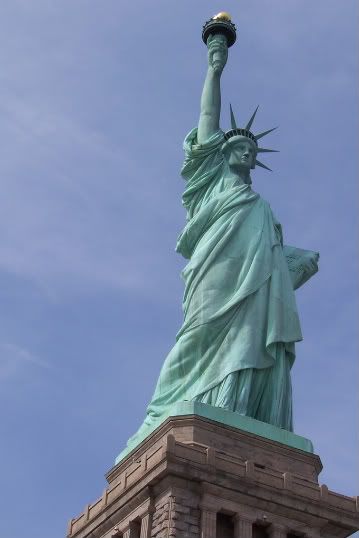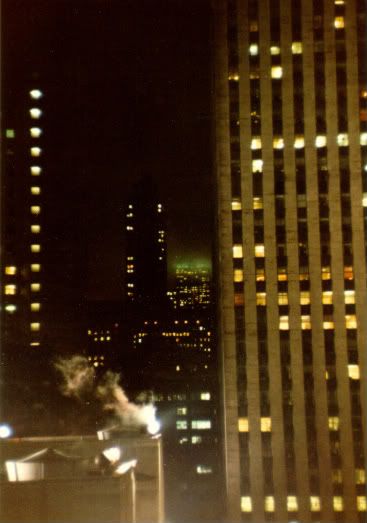Wednesday, August 03, 2005
Chaos
Blood in the sand.0 comments
American troops, and now reporters, are increasingly caught in the cross-fire of this U.S.-sponsored Iraqi Civil War.
On Monday, in Sunni-controlled Haditha near the Syrian border:
6 Marine Snipers Are Slain in Ambush in Western Iraq; Another Dies in Suicide Attack
The deaths on Monday took the American toll in Iraq past 1,800, The A.P. reported.
Violence continued in other parts of Iraq as well. A group calling itself the Supporters of the Sunni People said its members had killed 15 Shiites at a fake checkpoint it had set up on a highway south of Baghdad. The Web site posting said the insurgents had stopped cars and pulled out Iraqis who appeared to be members of Shiite militias.
"More than 15 Shia who were proven to be related to the parties who support the crusaders in Iraq were killed," the posting said.
On Tuesday night, in Shiite-controlled Basra:
New York Journalist Is Executed in Iraq
[Steven] Vincent was particularly incensed about the sharp divide between men and women in the Islamic world, and about the increasingly religious mores in Basra that forced women to wear full-length black robes in public. He said he fully supported the Iraq war, believing it was part of a much larger campaign being waged by the United States against "Islamo-fascism." But Mr. Vincent said he was also disappointed by the failure of the United States and Great Britain to enforce their visions of democracy here in Iraq, instead allowing religious politicians to seize power across the south.
Conservative Shiite parties have strengthened their hold on Basra since the January elections. They include the Supreme Council for the Islamic Revolution in Iraq, which was founded in Iran and wields enormous power in Baghdad, and the Fadilah Party, started by Ayatollah Muhammad Yacoubi, a hard-line cleric. The organization of Moktada al-Sadr, the young cleric who has led two rebellions against the Americans, also has great influence in Basra.
In his op-ed in The New York Times, Mr. Vincent wrote that "it is particularly troubling that sectarian tensions are increasing in Basra, which has long been held up as the brightest spot of the liberated Iraq."
Policemen, he said, were responsible for carrying out many of the assassinations of former Baath Party officials, in revenge for the oppression of the Shiites under Saddam Hussein.
"Unless the British include in their security sector reform strategy some basic lessons in democratic principles, Basra risks falling further under the sway of Islamic extremists and their Western-trained police enforcers," he wrote.
On Wednesday, again in Sunni-controlled Haditha:
14 U.S. Marines Killed in Iraq When Vehicle Hits a Huge Bomb
And this madness we've unleashed is still waiting to explode in the north, where the Sunnis, Shiites and Kurds are waiting for the first salvo to be tossed in order to wage war among themselves over control of the Kurdish territory, especially oil-rich Kirkuk. Of course, this has the potential to embroil all the warring factions within Iraq, along with Iran, Turkey and Russia, all of whom have large Kurdish populations in their territories bordering Iraq. This fight could become regional with a few well-placed bombs or assassinations.
Faoud Masoon, the deputy chairman of Iraq's constitutional committee, said two of the most contentious points in the new charter—the future of the contested city of Kirkuk and the control of a number of Kurdish-populated enclaves in the north—would be largely put off for a future government to resolve.
Mr. Masoon said the committee members had reached a tentative agreement to include language in an "annex" to the constitution that would call for a reversal of the ethnic cleansing of Kirkuk, then the conducting of a census and a plebiscite to determine whether the city would revert to Kurdish control.
In a campaign known as Arabization, agents of Saddam Hussein's government evicted tens of thousands from Kirkuk and the surrounding region in the 1980's, and imported thousands of Arab families from the south to take their place. Since the fall of Mr. Hussein, Kirkuk has become a violent metropolis, contested by Arabs, Turkomens and Kurds, while tens of thousands of Kurds trying to return to their homes have piled into squalid shantytowns outside the city.
Still, Mr. Masoon said the annex calling for the reversal of Arabization in Kirkuk included no timetable for the policy.
Likewise, he said, the annex contained no timetable for determining the status of a number of smaller Kurdish enclaves in northern Iraq that Kurdish leaders want to bring under the control of the Kurdish regional government.
"We are not discussing the territorial issue in the constitution," said Mr. Masoon, who is also a leader in the Patriotic Union of Kurdistan, one of the main Kurdish political parties.
A bomb, sitting on an explosive, sitting on a powderkeg.
With coalition forces sitting right in the middle.
Support The Troops.
posted by Gotham 2:24 PM
0 Comments:

